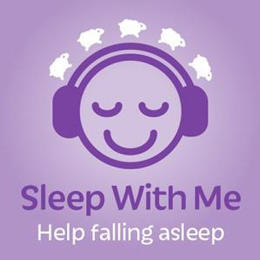Creativity Secrets From The Man Behind The “Sleep With Me” Podcast
Always-on technology and digital devices creeping into our bedrooms have turned all of us into insomniacs. It doesn’t help that we live in a culture that celebrates the “secret to success” as getting by on as little sleep as possible.
Long before mobile screens illuminated our pillows, a young Drew Ackerman was suffering from insomnia. But unlike many who spend nights unable to fall asleep, Ackerman’s insomnia took him through a decades-long creative process that resulted in the podcast Sleep with Me.
Currently, three episodes air weekly and draw around 70,000 listeners for each show. Users download episodes around 1.3 million times each month. In 2014, Sleep with Me appeared on iTunes’ list of top 50 podcasts, alongside brands like NPR, Earwolf, and ESPN. Ackerman, who also works as a librarian in San Francisco, recently hired two freelance editors and attributes the show’s success to his ability to tell a good boring story—which all started in the room he shared with his little brother.
Throughout their childhood, the two would tell each other boring stories to help them fall asleep. The adult Ackerman continued telling what he calls “long, boring, leisurely plodding-plot stories” to help lull loved ones, from significant others to his 9-year-old daughter, to sleep.
In 2013, when another project fell apart, Ackerman decided he would use the time he’d already put aside to start the bedtime-storytelling podcast he’d been dreaming of for years. “It was weird, I never have well-adjusted thoughts like this,” Ackerman tells Fast Company, “but the project imploded and on that day, part of me was like, ‘why don’t you do that podcast with that time that you already set aside? I thought, I guess I will listen to whoever’s voice this is.”

So began Sleep with Me, where Ackerman’s known as “Dearest Scooter.” The original 20-minute segments, gave way to hour-long narratives when the 42-year-old decided short tales caused listeners too much anxiety as most weren’t asleep yet by the end. On Sundays, Ackerman believes people need a little more time to slow their racing minds, so episodes then tend to go past the hour mark.
In a low vocal range, Ackerman tells tales of a magical pirate woman name Lady Witchbeard, gives a monologue about the Red Priestess Melisandre’s famed choker (known to all Game of Thrones fans), and narrates what it’s like to walk through a mall of the future.
In the intro to some of the shows, Ackerman refers to it as “the podcast the sheep listen to when they get tired of counting themselves.” But it takes Ackerman about 50 hours each week to perfect the tone and pacing of the kooky plot lines that aim to drift today’s overstimulated brains off to sleep. Here’s how he does it.
FC: You call the podcast “boring.” What does “boring” mean to you?
DA: By using the word “boring,” I let the listener off the hook. There’s no expectation on their end. If you say something is boring, then people don’t have to listen or take any lesson from the story. It sets up a non-intimidating environment.
But, if the podcast is too boring, it wouldn’t work. The podcast needs to be a fine line between uninteresting or mundane and somewhat engaging. I’m always shooting for somewhere in that middle place.
What kind of role has working at the library played in your love of stories?
Stories and reading have always been a part of my life. In the summer, my mom used to drop us off at the library, me, my brother, and sister. We were the oldest of six kids. We would go to the library and read and participate in the programs. I always loved hiding in my room and reading, so stories have always played a huge role in my life. That’s the great part about my job. I get to do these things all the time.
How do you come up with your stories?
I let the idea come up, kind of think about it, play with it and give it space to come back more formed. For example, right now, I’m doing a science fiction series every Thursday where I’m on a spaceship with the nuns from my grammar school. They used to terrorize me. I knew I wanted to do a story about the nuns. I let that idea sit, then I had the idea of working with them on a team and finally, came up with the spaceship bit.
Then sometimes, there’s more immediate stories. For instance—I think this one will come out next week—Helen Zaltzman who makes the Allusionist podcast, I follow her on Twitter and she recently posted this picture of a dollhouse. This dollhouse has no furnishing and was so dirty inside. There was something about the image of this vacant dollhouse with all this dirt that I couldn’t get out of my mind.
I would forget about it sometimes but only for a day. Then I thought of the title “The Dirty Dollhouse” and I just really liked that. Then last weekend, I couldn’t stop thinking about this dirty dollhouse and then I was thinking about Helen. So I looked on Twitter to see what’s trending in the U.K. where Helen is from, and that led me to think about Brexit and Oxford University. And that’s the story behind where the dirty dollhouse comes from.
What’s your process for keeping a record of ideas for your stories?
I have pen and paper for the most part. I have a notebook in my pocket and I have a Steno pad in my backpack and a legal pad on my couch. I write down my ideas and if it’s a picture, I’ll write down the title or description.
How long does it take for you to come up with stories?
People say it’s your imagination or your selective subconscious. I call it the “story swamp.” I don’t know if it’s my brain or in the universe’s brain. Some stories sit down there and sometimes I have stay down there and dig around.
Some have to sit in the percolator for six months but others, like the dollhouse one, I couldn’t stop thinking about it. Nonetheless, I make sure to write every day for half an hour to an hour on my commute and the episodes take about a week to finish. On Thursdays, I write the outlines and the dialogues for episodes. The day after it’s recorded, I listen to the episodes and see what changes I need to make.
How has the podcast affected your day job?
I have become more productive. The podcast has helped me to focus. I’m a very anxious person. I get so much general anxiety. I have to focus on something to tune that out. The podcast is so much work. It is very encompassing of my spare time. Any time I’m not at work and I don’t have a family commitment, I have to be working on the podcast. Even if I’m at work, I ask myself, do I need to check my email again right now, or work on this other task that I need to do. It has helped me be more productive and I’ve learned that small tasks help me deal with my anxiety.
What do you do when you’re running low on creativity?
I’ll look on Twitter to see what’s trending. Also, the power of the deadline helps me push through when I’m low on creativity. That’s the secret of the podcast. Sometimes I have a couple of episodes in the bank but I have a day job, so I have to record something during the time I set aside because I don’t have any other time. The episodes need to come out. If I’m not feeling it, I remind myself that this is a podcast to put people to sleep. I have to put my perfectionism aside. That’s when the stories work. If I’m calm, the stories are more relaxed and more fun. They’re more ridiculous and absurd.
Do you listen to stories to fall asleep?
Once I started thinking about the podcast, I would listen to audiobooks, but I was always more of a person-to-person storyteller. It made me think, why isn’t there bedtime stories for grownups? I know adults want bedtime stories, why aren’t there more people out there providing it?
So what do you do then before sleep?
If I get too worked up on the future of the podcast, it can affect my sleep. I try to put myself in the listener’s shoes and say, ‘OK I need to stop what I’m doing an hour before bed.’ I try to maintain a consistent routine like sit quietly, meditate, write, or I just read, usually fiction, for 45 minutes to unwind and help myself drift off.
Fast Company , Read Full Story
(22)













